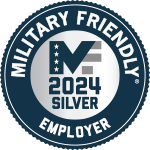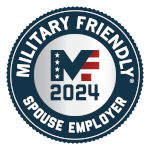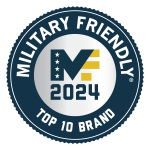



 Rank:5
Rank:5We rate how Military Friendly an organization is within 6 different categories. Learn more about our methodology.

West Virginia University understands its success depends on recruiting and hiring a highly-skilled and diverse workforce. Veteran-focused recruitment efforts, job-search training events and specifically targeted outreach activities are all designed to create an awareness of employment opportunities available to veterans at WVU. Not only have veterans earned our gratitude and respect through service to our country, WVU recognizes and places a high value on the attributes they bring to the workforce: leadership, teamwork, integrity, punctuality, adaptability, efficiency, technical and IT skills, respect for procedures, accountability, diversity, and global perspective.

© 2024 VIQTORY | Military Friendly® is owned and operated by VIQTORY, a service-disabled, veteran-